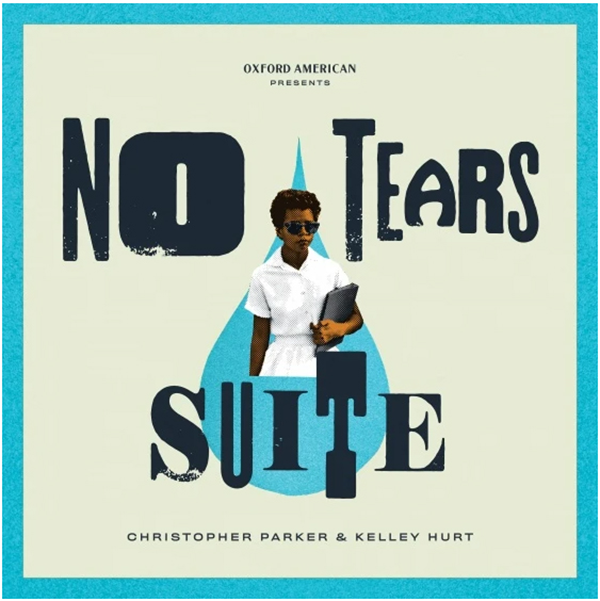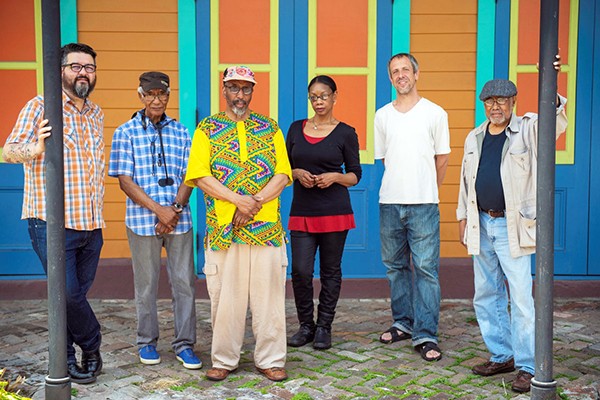As 2020 settled into its longest nights last month, one bright spot was an online video concert by a septet stacked with Memphis-affiliated players. As virtual concerts go, it was notable both for its technical clarity and for mixing compositional craft, spontaneity, joy, and gravitas in equal measure. That made it a fitting capstone presentation of a work that has been evolving in various iterations over years: No Tears Suite, composed by onetime Memphian Christopher Parker and Memphis native Kelley Hurt, now married and residing in Little Rock.
Though the couple met in Memphis, living in Arkansas had everything to do with the creation of No Tears Suite, a musical meditation on the Little Rock Nine, the Black students who courageously defied the state’s segregationists and walked into Little Rock Central High School after a monthlong standoff in 1957. Speaking in 2019 to the Oxford American, which commissioned the piece, Parker said, “It was a hometown kind of thing. I grew up here, and all my life, whenever you bring up Central High and 1957, either the conversation is going to be negative or people don’t want to have that conversation. And yet we were one of the first states to force integration. … We should be celebrating what happened then, but that also means you have to acknowledge that huge parts of our community were racists who wanted to tear nine kids limb from limb.”
Hurt saw the historical moment through a more regional lens. “I grew up in Memphis,” she told the magazine, “and that city holds a lot of weight. The assassination of Dr. King is something that changed the city forever, the way people interacted with each other, and especially the music. Coming from there to Little Rock, you start to wonder, do all cities have this kind of weight?”

Whatever its provenance, that weight is felt in the lyrics she brought to the composition, based largely on Melba Pattillo Beals’ memoir Warriors Don’t Cry. Hurt’s recital of the students’ and others’ names and biographies in “Roll Call” carries both heaviness and beauty, especially when accompanied by the very heavy band, which includes, in the latest version, percussionist Brian Blade, bassist Roland Guerin, tenor saxophonist Bobby LaVell, trumpeter Marc Franklin, and alto saxophonist Chad Fowler, along with Parker on piano and Hurt on vocals.
The sensitivity of the players makes the piece a worthy inheritor of a vital, often overlooked tradition of jazz that addresses the civil rights movement, such as Sonny Rollins’ “Freedom Suite” (1958) and the album We Insist! and Max Roach’s Freedom Now Suite (1960). In walking a fine line between a composed piece and the audacity of free improvisation, No Tears Suite dredges up the turbulent passions of America’s racism and as such serves as a kind of exorcism. But, as Hurt noted in 2019, it also embodies more positive emotions. “We treat it more as a celebration than as something terrible that happened. It’s a celebration of those young people that had the courage to bring attention to themselves. That’s a hard decision to make when you’re a kid.”
That may best be expressed in the nearly euphoric “Don’t Cry (Warrior’s Song),” with its hard-swinging, slamming chords and intricate unison horn lines, as Hurt sings, “Don’t cry, sister, don’t cry, don’t let them see you shed a tear. Beaten and bruised, yeah, you refused. There are no cowards here.” It’s cathartic, and some of that lies in the composition itself. It can be heard in other versions of the suite, such as its premiere on the Little Rock Central High School National Historic Site in 2017, the studio recording from the same year (released on Mahakala Music last September), or the 2019 expanded arrangement with members of the Arkansas Symphony Orchestra.
But an additional layer of celebration arose from the particular day on which the online concert was recorded: November 7, 2020. “We started recording this directly after the networks called the presidential race for Biden,” says saxophonist Chad Fowler. “Nobody mentioned politics, but I felt like there was a calm that came over us all and was reflected in the music.”
No Tears Suite can be viewed at youtube.com/user/oxfordamerican.
 Marc Pegan
Marc Pegan